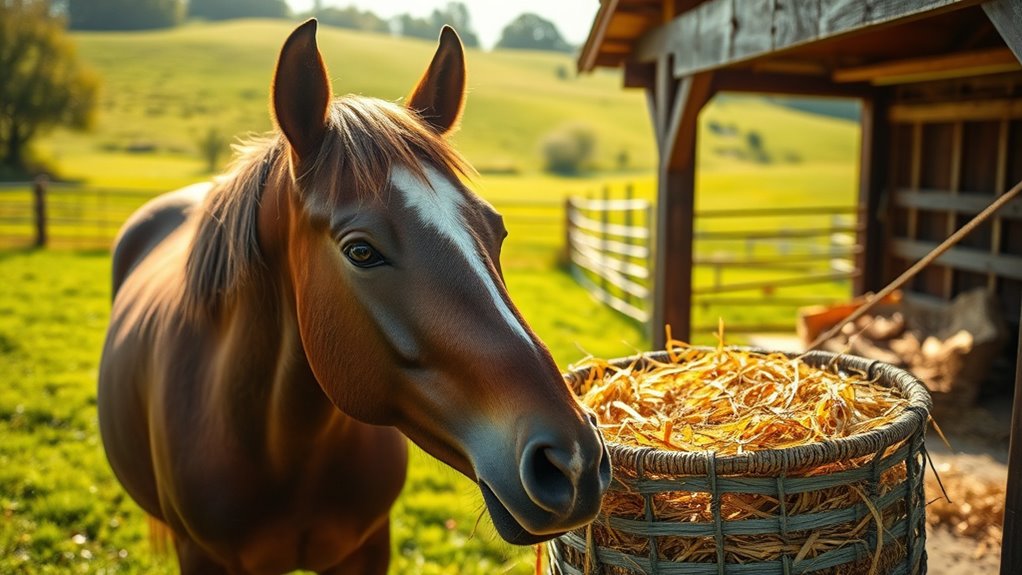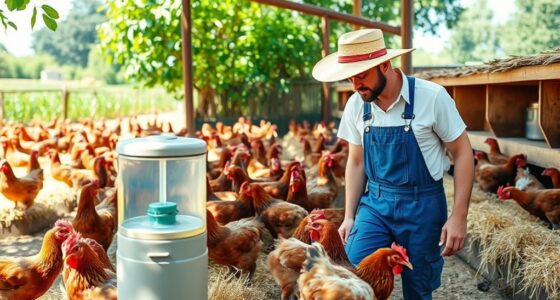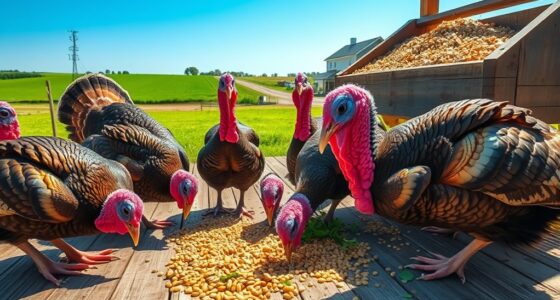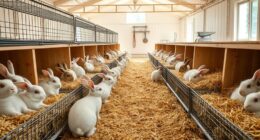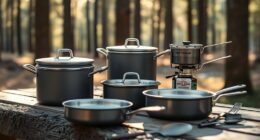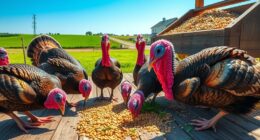To care for horses on small farms, focus on providing balanced nutrition with quality forage and fresh water. Make certain they have access to shelter and shade to protect from extreme weather, and keep their environment safe by regularly inspecting fencing and the area around them. Daily grooming and health checks help catch issues early. Staying attentive to these essentials will keep your horses healthy and happy; there’s much more to discover to ensure their well-being.
Key Takeaways
- Provide balanced, high-quality forage and monitor weight to meet horses’ nutritional needs.
- Ensure access to adequate shelter and weather protection for comfort and safety.
- Maintain clean, dry bedding and regular grooming to prevent skin and hoof issues.
- Use sturdy fencing and rotate pastures to prevent overgrazing and reduce parasite risks.
- Conduct daily health checks, monitor behavior, and ensure fresh water for overall well-being.
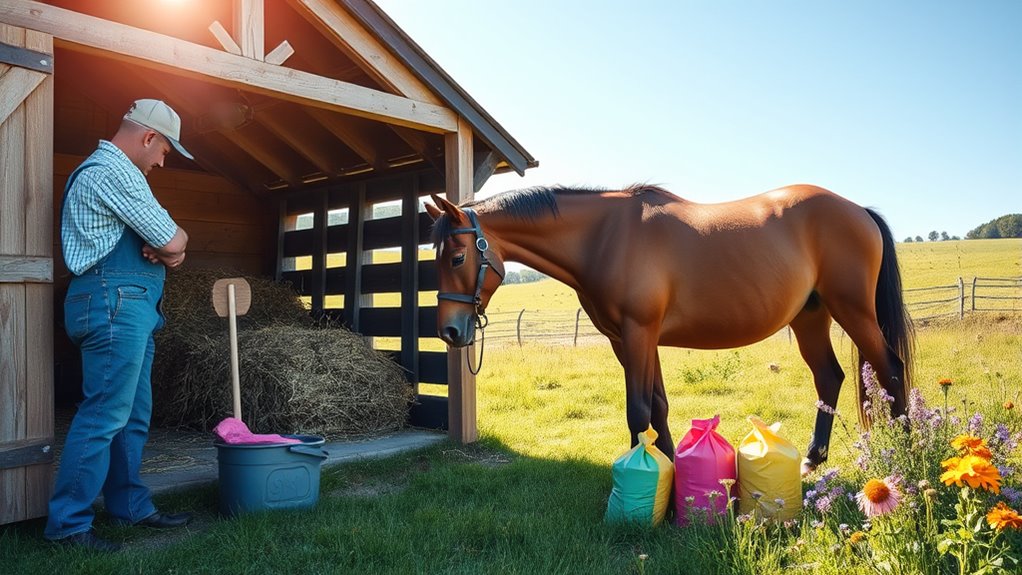
Caring for horses on small farms requires careful planning and daily attention to guarantee their health and well-being. One of the first things you should focus on is maintaining their overall cleanliness and comfort through regular horse grooming. Grooming isn’t just about keeping your horse looking good; it’s essential for their health. Brushing removes dirt, loose hair, and sweat, which helps prevent skin infections and keeps their coat shiny. It also gives you a chance to check for cuts, swelling, or signs of illness. Pay attention to their hooves, picking out dirt and debris daily to prevent thrush or hoof problems. Proper grooming also fosters a bond between you and your horse, making handling easier and more enjoyable.
Regular grooming keeps your horse healthy, comfortable, and strengthens your bond.
Equally important is pasture management, which directly impacts your horse’s nutrition and safety. You need to guarantee your pasture provides high-quality forage without risking overgrazing. Rotate grazing areas if possible, to give grass time to regrow and stay nutritious. Keep an eye out for poisonous plants or weeds, removing them promptly to prevent ingestion. Proper pasture management also involves controlling parasites; rotating grazing areas reduces parasite load, but you should also implement deworming schedules based on fecal egg counts or veterinarian advice. Fencing should be sturdy and well-maintained, preventing escapes and protecting your horses from wandering into dangerous areas. Shade and shelter are essential, especially during extreme weather, to keep your horses comfortable and prevent heat stress or cold-related issues.
Daily pasture inspections are key to spotting hazards like fallen branches, holes, or debris that could cause injury. During these checks, you can also assess the overall health of the pasture and make adjustments as needed. Good pasture management promotes healthy eating habits, reduces stress, and minimizes health problems like colic caused by poor-quality forage or sudden dietary changes. Incorporating rotational grazing also helps maintain soil health, which benefits your horses by providing a sustainable source of nutritious forage. Additionally, being aware of ice cream flavors and their ingredients can be relevant when considering treats or supplements for your horses, ensuring you choose options that are safe and appropriate.
In addition to grooming and pasture management, you should develop a routine to monitor your horses’ overall condition. Regularly check their weight, coat condition, and behavior for signs of discomfort or illness. Hydration is essential, so always ensure fresh water is available. By staying attentive to these basics—grooming, pasture management, and overall health checks—you create a safe, healthy environment that supports your horse’s well-being on your small farm.
Frequently Asked Questions
How Do I Prevent Horses From Escaping Small Farm Fences?
To prevent horses from escaping small farm fences, guarantee you have proper fence installation with sturdy materials like high-quality wood or electric fencing. Regularly inspect for weak spots, loose boards, or gaps that horses could exploit. Use escape prevention techniques such as electric wires or smooth wire to deter attempts at escape. Keep fences well-maintained, and address any damage immediately, so your horses stay safe and secure within their designated area.
What Are Signs of Common Horse Illnesses in Small Farms?
You might notice signs of illness in your horse through behavioral changes like lethargy, decreased appetite, and altered gait. It’s often thought that these signs are subtle, but they can indicate serious health issues. Keep a close eye on any unusual swelling, nasal discharge, or abnormal posture. Early detection is key, so monitor your horse regularly for any signs of illness, and consult a veterinarian promptly if you observe concerning changes.
How Can I Effectively Train Young or Unruly Horses?
To effectively train young or unruly horses, focus on groundwork training to establish trust and respect. Use positive reinforcement, like treats or praise, to reward good behavior and encourage learning. Be patient, consistent, and calm, ensuring your horse feels safe and understood. Keep sessions short and frequent, gradually increasing difficulty. This approach builds a strong bond and helps your horse become more obedient and confident over time.
What Are the Best Ways to Manage Manure Responsibly?
You should implement effective manure management plans by regularly collecting manure and composting it properly. Use composting methods like turning the pile and maintaining the right moisture and temperature to reduce odor and kill pathogens. Proper manure management not only keeps your farm clean but also benefits your soil. Always follow local regulations and consider using composted manure as a nutrient-rich fertilizer, ensuring responsible waste management on your small farm.
How Do I Handle Emergency Situations Like Injuries or Illness?
When emergencies strike, you jump into action like a superhero! First, stay calm and assess the situation quickly. Keep emergency preparedness at the ready—have first aid supplies nearby and know how to use them. Call your vet immediately, and don’t try to do too much yourself. Your quick, confident response can make all the difference, turning a crisis into a manageable situation.
Conclusion
Remember, caring for your horses is like tending to a treasured garden—needs patience, attention, and love. By providing proper nutrition, shelter, and safety, you guarantee they thrive under your watchful eye. Just as a shepherd protects his flock, you become their guardian. When you prioritize their well-being, you create a bond as enduring as the legends of old, proving that dedicated care turns small farms into havens where horses truly flourish.

